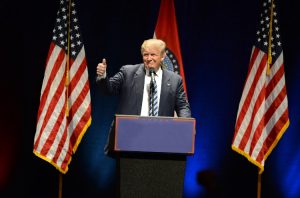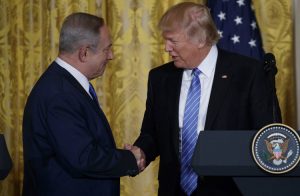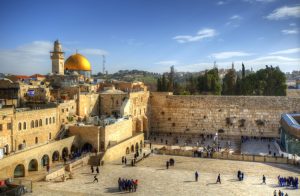
Planes of gold. Chairs of golden. Wall of gold. Elevators of gold. Gold. Gold. Gold.
Presdient Trump loves everything gold.
On December 6th, President Trump officially showed his love once again for gold, by recognizing Jerusalem, the City of Gold, as the capital of the State of Israel. He recognition brings the executive branch into compliance with a bill passed in congress in 1995. This was an amazing display of friendship between Israel’s greatest of friends, and comes a few months after the US announced that it was to open its’ first air base in Israel.
But was the announcement all that it is being made out to be?
Like all things, we must start from the beginning. In 1995, Congress passed a bill that states very simply that as a:
Statement of the Policy of the United States. –
It seems from the speech that President Trump gave, that the official US policy will now follow numbers two and three. On number one, not so much. As the president added this caveat to his pronouncement:
“The specific boundaries of Israeli sovereignty in Jerusalem are subject to final status negotiations between the parties. The United States is not taking a position on boundaries or borders.”
So basically, the president recognized Jerusalem as the Israeli capital. As to where Jerusalem is is to be left for future negotiations.
This caveat may seem that this may not have been as great an announcement as is being portrayed. That, I believe, would be a mistake, as this does mean a great deal. And by deal, I mean it in the Trumpian sense: negotiations. See, to the Arabs living in Israel, they want all of Jerusalem (they want all of Israel too, but right now we are just sticking to Jerisalem). The Arabs have always gone to the bargaining table claiming they want all of Jerusalem. The US diplomats, which are acting within executive branch, would consider this a fair claim since they did not have an official policy. Now when they sit down with both sides, and/or other Arab countries, the starting point is no longer the entire Jerusalem, but something else. Though that something else is ambiguous, it definitely better than no policy.
There is another issue as well, and that is the State Department. It has always been against Israel. It was dead set against President Truman recognizing Israel some 11 minutes after Ben Gurion announced independence. Today this may seem ironic, as they are housed in the Harry S. Truman Building. Both Hillary Clinton and John Kerry went from voting for the bill allowing Jerusalem, Israel on birth certificates and passports when they were in congress, to being vehemently against it when they were Secretaries of State. It seems just working there turns you into a rabid Israel hater.
As some of you may know, Menachem Zivotovsky, who was born in Jerusalem in 2002, sued unsuccessfully to force the government to print Jerusalem, Israel on his passport and Consular Report of Birth Abroad. The case made it all the way to the Supreme Court, which ruled that the Executive Branch has the reserved right on all matters of foreign affairs. As, such, even though congress passed a law stating that Jerusalem, Israel can appear on a passport if the person being issued the passports wants, if the President felt that it would interfere with foreign affairs, then he does not have to comply. (though this power was ruled plenary, and that a law passed by congress has no force, the spending mechanism they put in place, to not fund the Tel Aviv Embassy, would take effect, as spending is a plenary power of congress.)
A day after the President made his remarks on Jerusalem, Matt Lee who covers the State Department for the Associated Press had the opportunity to ask the David Satterfield, who is now the acting assistant secretary for the Near East in the State Department if their policy would now change.

Here is their exchange:
ML: “What is the capital of Israel?”
DS: “The president announced yesterday, issued a proclamation declaring the United States recognizes Jerusalem as the capital of the state of Israel.”
ML: “So the answer to the question is Jerusalem, correct?”
DS: “That’s exactly right.”
ML: “What country is Jerusalem in?”
DS: “The president recognized Jerusalem as the capital of the state of Israel,”
ML: “Does that mean then that the US government officially recognizes that the Jerusalem municipality lies within the state of Israel?”

Now to most, the answer would be a logical yes. But not the State Department. David Satterfield answered, “there has been no change in our policy with respect to consular practice or passport issuance.”
Nathan Lewin, in an article in the Jewish Press, called on the State Department to withdraw this regulation, and even hinted that another lawsuit may be coming in the near future.
But getting back to just the recognition of the president that Jerusalem is the capital of Israel, there may be a good reason Trump did it now. And why he did it with mere words? After all, opening an embassy in Jerusalem wouldn’t take years to build, just a sign change above the door of the consulate that’s already there.
It seems, from reports, that Trump wanted to do the move on day one, but was being told that it would interfere with the negotiations. It is why he signed the first waiver. It seems that a week or two before his announcement, the president became furious that negotiations were not progressing as fast as he liked, and that the same old excuses (probably from the State Department) were getting everyone nowhere fast. So, he decided that he would try an innovative approach. He would acknowledge reality. This is something that, as a master negotiator in business (just ask him, he’ll tell you), can lead to better negotiations. It sets a baseline from where the two sides may start. Up until now, the Arabs had an expectation that they would get the entirety of Jerusalem. This is an absurd notion. Especially as almost daily now, more and more houses in the Arab quarter are once again seeing Jewish owners.
Now, when the Arabs sit across the table from the Israeli government, they know that the USA considers Jerusalem to be the capital of Israel, and no country gives away its capital. It could be that the president wants them to think in their own minds that there is now timetable being set in motion. That after getting nowhere in a year, Jerusalem is now recognized by the entirety of the US government as the capital of Israel. If the Arabs don’t start negotiating like normal civilized peoples, parts of the Judea and Samaria may get recognized as parts of Israel too. They cannot believe that acts of terror will get them more; that their unwillingness to even come to the negotiating table, stalling to try to wear down the Israelis, will work in them getting more concessions is no longer the tactic to use.
The president understands deal making. He also understands how deals are made using different tactics in various parts of the world. Cultural customs and norms change from place to place, and playing by our rules on the other’s turf is “catastrophe” waiting to happen. Just look at the Iran Deal. In the Middle East, the appearance of weakness is a huge negative to have when negotiating terms. The president has now played the cards as he sees reality has dealt, not how the State Department wished.
So, when all is said and done, I believe we now have the Trump Doctrine…
Facing reality!

You must be logged in to post a comment.